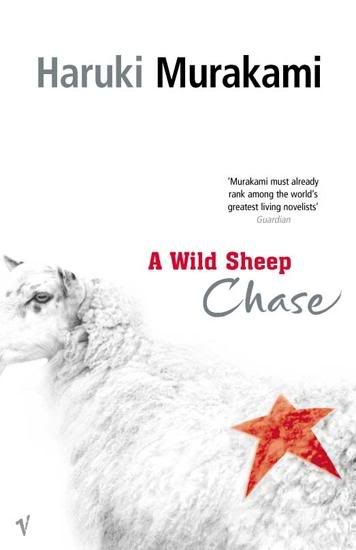 The amazing thing about Murakami's books is, you never know what you're going to get - when that bridge between reality and surrealism will get crossed, and, what avenues the surrealism will take. Past experiences with Murakami have also taught me that the story is not going to be like anything I've read before. Experience is a great teacher.
A Wild Sheep Chase, originally published in the early 1980s, is literally the story about a young man (who is a partner at an ad agency and PR firm) and his girlfriend's (a girl with the most sensual ears) quest to find a sheep - not just any sheep, but a sheep with a star on its back; a sheep that, by all rights, shouldn't exist in Japan, where all sheep breeds have always been monitored and documented closely. You could say that their search is a metaphorical wild goose chase, but....
The amazing thing about Murakami's books is, you never know what you're going to get - when that bridge between reality and surrealism will get crossed, and, what avenues the surrealism will take. Past experiences with Murakami have also taught me that the story is not going to be like anything I've read before. Experience is a great teacher.
A Wild Sheep Chase, originally published in the early 1980s, is literally the story about a young man (who is a partner at an ad agency and PR firm) and his girlfriend's (a girl with the most sensual ears) quest to find a sheep - not just any sheep, but a sheep with a star on its back; a sheep that, by all rights, shouldn't exist in Japan, where all sheep breeds have always been monitored and documented closely. You could say that their search is a metaphorical wild goose chase, but....
So, what's special about the sheep with the star on its back? Well, he's this omnipotent super-intelligent power, that takes over human beings, and makes them immense despite their innate mediocrity. However, when the sheep's finished using one person, it leaves the body, in search for its next target, leaving the previous inhabitant sheepless.
In the story, the sheep had inhabited inside the right-wing Boss, a character who sat at top of the Tokyo food chain. Boss was mediocre; there was nothing special about him, until the sheep took over, and made him the single power that controlled almost all the advertising, stock markets and even information services in Tokyo. In 1936, Boss had been diagnosed with a fairly large brain tumour, which hadn't killed him - the miracle lay in him still being alive! Now, sheepless, the boss is at the brink of death, and his right-hand man manages to corner the book's narrator to search for the sheep, so that the Boss can be effectively replaced at the top, and the network built over the years will not disintegrate into nothing. The narrator does attempt putting a feeble fight, when he's cornered, but, the rest, as they say, is history.
Nor do you know where you stand. Now listen, I thought it over last night. And it struck me. What have I got to feel threatened about? Next to nothing. I broke up with my wife, I plan to quit my job today, my apartment is rented, and I have no furnishings worth worrying about. By way of holdings, I've got maybe two million yen in savings, a used car, and a cat who's getting on in years. My clothes are all out of fashion, and my records are ancient. I've made no name for myself, have no social credibility, no sex appeal, no talent. I'm not so young anymore, and I'm always saying dumb things that I later regret. In a word, to borrow your turn of phrase, I am an utterly mediocre person. What have I got to lose? If you can think of anything, clue me in, why don't you?
And yes, that's the narrator for you! You might have noticed I haven't used any names - just references - and that's because Murakami himself doesn't use any names in the books.
The book is a timeless universal one, where the narrator could have as easily been running an ad agency in the States, as in London, as in... well, Tokyo! Quoting Murakami:
There's not a branch of publishing or broadcasting that doesn't depend in some way on advertising. It'd be like an aquarium without water. Why, 95 percent of the information that reaches you has already been preselected and paid for.
The journey taken by the nameless narrator and his girlfriend takes them to places far and remote, where the population is in the thousands. They meet plenty of fascinating people referred to as the Sheep Professor - someone who was once inhabited by the sheep, but is now sheepless, and has devoted the rest of his life searching for the sheep; the Sheep Man - a person who is half-sheep, half-man; and Rat - an old friend of the narrator, who actually lands the narrator in his present situation.
While the narrator undergoes a physically challenging and mentally exhausting journey (peppered with sex, cigarettes, alcohol, and Sherlock Holmes), the reader embarks on a philosophical journey, in order to determine what the search is actually for. What does the sheep symbolise? Totalitarian power? The devil? And, what is the sheep searching for, that makes him constantly discard people and occupy others? Sufficient weakness to takeover, and turn the victim's weaknesses into a thing of the past? And, what will the outcome of this search be? Will sheep end up ruling the world, by occupying people, through their supreme intelligence?
Murakami's casual style of writing, filled with modern day references and thought-provoking allegories makes for a good read. Add to that the surrealism, the randomness, and the incredibly fascinating characters, and the good read becomes and extremely captivating one.